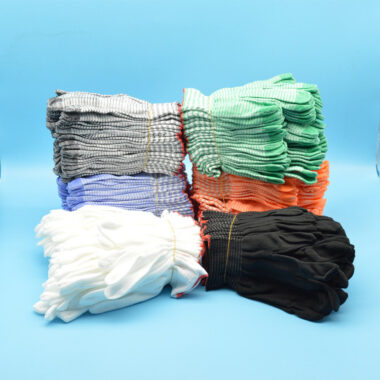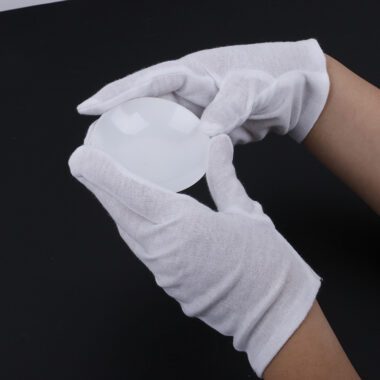Nitrile-coated work gloves are among the most popular choices for workers needing both superior grip and protection, and for good reason. Here’s why:
1. Enhanced Grip
- Nitrile Coating Texture: Nitrile gloves often have a textured coating on the palm and fingers, which increases friction and enhances grip. This is especially useful when handling wet, oily, or slippery materials.
- Oil & Chemical Resistance: The nitrile coating is highly resistant to oils, solvents, and chemicals. This means it not only provides better grip in these situations but also protects the skin from harmful substances.
- Versatility: The textured surface allows for a secure grip in various industries, from construction and automotive to medical and food processing, where a reliable hold on tools and materials is crucial.
2. Cut and Abrasion Resistance
- Cut Resistance: While nitrile itself is not inherently cut-resistant, it can be paired with materials like HPPE (High-Performance Polyethylene) or Kevlar in the glove lining to provide extra cut protection. This combination provides a great balance of dexterity and defense against sharp objects.
- Abrasion Resistance: The nitrile coating is tough and resists abrasion, ensuring that gloves maintain their integrity even in rough environments where hands come in constant contact with abrasive surfaces (e.g., metal, concrete, or rough fabrics).
3. Chemical and Puncture Protection
- Chemical Protection: Nitrile gloves are a great barrier against oils, chemicals, and solvents, making them perfect for environments where workers handle hazardous materials. The coating doesn’t degrade easily when exposed to these substances, unlike latex or rubber gloves.
- Puncture Resistance: Nitrile is more puncture-resistant than natural rubber, so gloves coated in nitrile are less likely to tear or puncture under pressure, providing better protection when handling sharp tools or materials.
4. Comfort and Breathability
- Lightweight and Flexible: Nitrile-coated gloves are relatively lightweight and flexible, offering a high level of dexterity compared to other coated gloves (e.g., PVC). This allows workers to perform delicate tasks without sacrificing protection.
- Breathability: Many nitrile-coated gloves are designed with breathability in mind, keeping your hands cooler and reducing the chances of sweat buildup. This is especially important during long work hours.
5. Durability and Longevity
- Long-Lasting: Nitrile-coated gloves are highly durable and resistant to wear and tear, ensuring they last longer than other gloves. Workers get more use out of them before the need for replacement, which can save on costs in the long run.
- Better for Wet or Dry Environments: The nitrile coating doesn’t degrade when wet, which gives it an edge over latex and PVC gloves in environments where moisture is present.
6. Cost-Effective Protection
- Affordable and Reliable: Despite offering premium protection, nitrile-coated gloves are relatively affordable compared to other high-performance options like Kevlar gloves. This makes them a great choice for businesses that need to balance safety with cost.
7. Resistance to Various Conditions
- Heat and Cold: While nitrile doesn’t offer the highest resistance to extreme temperatures, it still performs well in moderate heat and cold conditions. For example, it’s suitable for workers in cold storage environments or in light welding tasks where exposure to heat is limited.
- Versatility: Due to their resistance to so many conditions, nitrile-coated gloves are versatile in industries like manufacturing, warehouse work, food processing, and even in medical settings for handling chemicals or cleaning products.
Industries That Benefit from Nitrile-Coated Gloves:
- Construction: Workers handling rough materials like wood, metal, or concrete benefit from both the abrasion resistance and secure grip.
- Automotive: Mechanics often need gloves that will protect them from oils and chemicals while allowing them to hold tools securely. Nitrile-coated gloves excel here.
- Food Processing: Due to their chemical resistance and grip in wet conditions, nitrile-coated gloves are popular for handling food safely and hygienically.
- Healthcare: In environments requiring protection from chemicals (disinfectants, cleaning agents), nitrile gloves are the go-to for their durability and comfort.
Conclusion:
Nitrile-coated work gloves offer a perfect balance of protection, grip, durability, and comfort, making them an excellent choice for a wide range of industrial and manual tasks. Whether you’re working with chemicals, handling sharp objects, or just need a dependable grip, these gloves have you covered.
Do you work in an industry where nitrile-coated gloves are essential, or are you exploring the best gloves for a specific task?





















